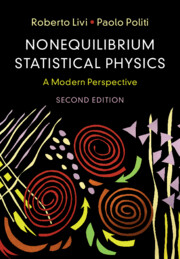Book contents
- Frontmatter
- Dedication
- Contents
- Preface
- Acknowledgments
- Notations
- Abbreviations
- 1 Kinetic Theory and the Boltzmann Equation
- 2 Brownian Motion, Langevin, and Fokker–Planck Equations
- 3 Fluctuations and Their Probability
- 4 Linear Response Theory and Transport Phenomena
- 5 From Equilibrium to Out-of-Equilibrium Phase Transitions: Driven Lattice Gases
- 6 Absorbing Phase Transitions
- 7 Stochastic Dynamics of Surfaces and Interfaces
- 8 Phase-Ordering Kinetics
- 9 Highlights on Pattern Formation
- A Binary Elastic Collisions in the Hard Sphere Gas
- B Maxwell–Boltzmann Distribution in the Uniform Case
- C Physical Quantities from the Boltzmann Equation in the Nonuniform Case
- D Outine of the Chapman–Enskog Method
- E First-order Approximation to Hydrodynamics
- F Spectral Properties of Stochastic Matrices
- G Reversibility and Ergodicity in a Markov Chain
- H The Ising Model
- I The Deterministic KPZ Equation and the Burgers Equation
- J Stochastic Differential Equation for the Energy of the Brownian Particle
- K The Kramers–Moyal Expansion
- L Probability Distributions
- M The Diffusion Equation and the Random Walk
- N Linear Response in Quantum Systems
- O Mathematical Properties of Response Functions
- P The Van der Waals Equation
- Q Derivation of the Ginzburg–Landau Free Energy
- R The Perturbative Renormalization Group for KPZ
- S TASEP: Map Method and Simulations
- T Bridge Model: Mean-field and Simulations
- U The Allen–Cahn Equation
- V The Gibbs–Thomson Relation
- W The Rayleigh–Bénard Instability
- X General Conditions for the Turing Instability
- Y Steady States of the One-Dimensional TDGL Equation
- Z Multiscale Analysis
- Index
7 - Stochastic Dynamics of Surfaces and Interfaces
Published online by Cambridge University Press: 19 June 2025
- Frontmatter
- Dedication
- Contents
- Preface
- Acknowledgments
- Notations
- Abbreviations
- 1 Kinetic Theory and the Boltzmann Equation
- 2 Brownian Motion, Langevin, and Fokker–Planck Equations
- 3 Fluctuations and Their Probability
- 4 Linear Response Theory and Transport Phenomena
- 5 From Equilibrium to Out-of-Equilibrium Phase Transitions: Driven Lattice Gases
- 6 Absorbing Phase Transitions
- 7 Stochastic Dynamics of Surfaces and Interfaces
- 8 Phase-Ordering Kinetics
- 9 Highlights on Pattern Formation
- A Binary Elastic Collisions in the Hard Sphere Gas
- B Maxwell–Boltzmann Distribution in the Uniform Case
- C Physical Quantities from the Boltzmann Equation in the Nonuniform Case
- D Outine of the Chapman–Enskog Method
- E First-order Approximation to Hydrodynamics
- F Spectral Properties of Stochastic Matrices
- G Reversibility and Ergodicity in a Markov Chain
- H The Ising Model
- I The Deterministic KPZ Equation and the Burgers Equation
- J Stochastic Differential Equation for the Energy of the Brownian Particle
- K The Kramers–Moyal Expansion
- L Probability Distributions
- M The Diffusion Equation and the Random Walk
- N Linear Response in Quantum Systems
- O Mathematical Properties of Response Functions
- P The Van der Waals Equation
- Q Derivation of the Ginzburg–Landau Free Energy
- R The Perturbative Renormalization Group for KPZ
- S TASEP: Map Method and Simulations
- T Bridge Model: Mean-field and Simulations
- U The Allen–Cahn Equation
- V The Gibbs–Thomson Relation
- W The Rayleigh–Bénard Instability
- X General Conditions for the Turing Instability
- Y Steady States of the One-Dimensional TDGL Equation
- Z Multiscale Analysis
- Index
Summary
An interface is rough if the mean square fluctuations of its position diverge at large times and system sizes. This may occur when the interface is driven out of equilibrium in the presence of some noise and the way roughness diverges defines suitable critical exponents. We introduce and discuss extensively two important universality classes: the Edwards–Wilkinson and the Kardar–Parisi–Zhang. The latter has been the subject of renewed interest since it was possible to determine analytically the whole spectrum of fluctuations and it was found an experimental system satisfying such predictions with great accuracy. The last part of the chapter is devoted to nonlocal models, specifically the celebrated Diffusion Limited Aggregation.
Keywords
Information
- Type
- Chapter
- Information
- Nonequilibrium Statistical PhysicsA Modern Perspective, pp. 271 - 318Publisher: Cambridge University PressPrint publication year: 2025
